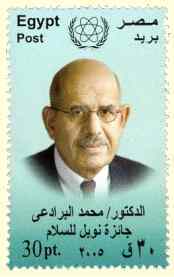 Mohamed El-Baradei, who regularly appears on television news programmes, has become the fourth Egyptian to win the world's most prestigious prize after he and the International Atomic Energy Agency received the 2005 Nobel Peace Prize for their work against the proliferation of nuclear weapons. The late President Anwar Sadat also shared the peace prize in 1979. Egyptian state television interrupted a soap opera on the announcement that Dr El-Baradei, Director-General of the UN Nuclear Agency, and the organisation had been awarded the prize. In a television interview, the country's Ambassador to Austria, Ramzy Ezz Eldin, said it was "a day of pride for all Egyptians". In Vienna, where the IAEA is based, El-Baradei, said he was "extremely humbled and honoured".
Mohamed El-Baradei, who regularly appears on television news programmes, has become the fourth Egyptian to win the world's most prestigious prize after he and the International Atomic Energy Agency received the 2005 Nobel Peace Prize for their work against the proliferation of nuclear weapons. The late President Anwar Sadat also shared the peace prize in 1979. Egyptian state television interrupted a soap opera on the announcement that Dr El-Baradei, Director-General of the UN Nuclear Agency, and the organisation had been awarded the prize. In a television interview, the country's Ambassador to Austria, Ramzy Ezz Eldin, said it was "a day of pride for all Egyptians". In Vienna, where the IAEA is based, El-Baradei, said he was "extremely humbled and honoured".
Dr Mohamed El-Baradei was born in Egypt in 1942. He gained a bachelor's degree in law in 1962 at the University of Cairo, and a doctorate in international law at the New York School of Law in 1974. His career began with the Egyptian Ministry of Foreign Affairs in 1964. In this position he served on two Permanent Missions of Egypt to the United Nations in New York and Geneva. Later, he also became a senior fellow in charge of the International Law Program at the United Nations Institute for Training and Research. He has also served as a senior member of the IAEA (International Atomic Energy Agency) Secretariat, and as the Assistant Director General for External Relations.
Throughout his career as a diplomat, an international civil servant and scholar, Dr. El-Baradei has experienced the processes of international organisations, concentrating in the fields of international peace and security and international lawmaking. He has lectured widely in the fields of international law, international organisations, arms control and the peaceful uses of nuclear energy. Further, he has devoted his career to studying and developing international laws.
Dr. El-Baradei has the knowledge, experience, and expertise to effectively lead the IAEA inspection teams. Some of the responsibilities and authorities granted to the IAEA and Dr. El-Baradei under UN Security Council Resolution 1441 include determining the composition of inspection teams and unrestricted rights of entry into and out of Iraq. The IAEA inspection teams will have unconditional, unrestricted access to any sites of concern and the names of all personnel currently and formerly associated with chemical, biological, nuclear, and ballistic programs. The resolution also gives Dr. El-Baradei the right to declare exclusion zones that suspend movement into and out of an inspection area. Further, the resolution gives the inspection teams the right to verifiably remove, destroy, or render harmless devices, records, or facilities that relate to prohibited weapons.
Dr Mohamed El-Baradei succeeded Dr Hans Blix as Director General of the International Atomic Energy Agency in December 1997 and was reappointed to a second term in September 2001. He was formerly a senior member of the IAEA Secretariat, holding, from 1984, a number of high-level policy positions, including that of the Agency's Legal Adviser and, beginning in 1993, Assistant Director General for External Relations.
Dr El-Baradei is married to Aida Elkachef, a kindergarten teacher at the Vienna International School who is a cousin of Ayatollah Mohammad Reza Mahdavi Kani of Iran. They have a daughter, Laila, a lawyer, and a son, Mostafa, a sound engineer, both of whom live and work in London.